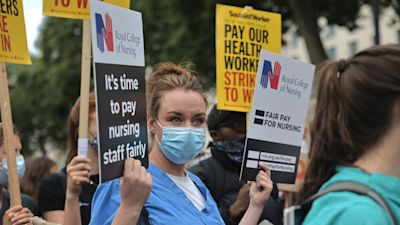Union calls for £2,000 uplift for NHS Wales workers after proposed 3% pay rise slated

A trade union is calling for every NHS worker in Wales to receive a £2,000 increase.
The campaign for the uplift by UNISON comes after the Welsh Government's proposal of a 3% pay rise, which was branded "bitterly disappointing".
The union says the 3% pay rise is effectively a pay cut in real terms with inflation at 3.9%.
UNISON has also voiced frustration about a lack of communication, claiming that the Welsh Government decided to impose the pay award without discussions with any of the NHS trade unions.
It said the Welsh Government had not challenged the UK Government’s decision not to provide additional funding for the pay award, meaning the 3% must be paid from the current NHS Wales budget.
Thousands of nurses, paramedics, hospital cleaners and other health workers will be able to have their say on the proposal during a consultation, which is open until 17 September.
The trade union says a majority vote against the pay rise is likely to trigger a ballot for industrial action.
Paul Summers, UNISON lead Health Officer, said: "Healthcare workers have endured a lot over the pandemic and made many sacrifices. They put Covid patients’ welfare before their own and hoped this would be properly recognised in a fair pay award.
"Politicians are happy to heap praise on healthcare workers but won’t give them a decent boost to their wages.
"We are calling on every NHS worker in Wales to make their voice heard in this pay consultation."
A Welsh Government spokesperson has said the 3% pay rise was "based on evidence submitted by all parties including trade unions".
“As well as the pay rise, we have also awarded NHS and social care staff with a one-off payment equivalent to £735 per person, to cover the basic rate of tax and national insurance contributions incurred. After deductions most people will receive £500.
“We hope NHS workers understand how much we value their work and appreciate everything they have done. We have accepted the independent recommendations in full dispute the majority of the public sector being under pay constraints."